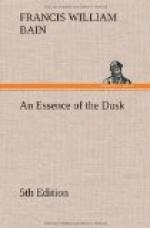[10] It may not be superfluous to remind the English reader, that, according to Hindoo ideas, there is no disgrace like that of possessing an unmarried daughter. Hence the practice, among the Rajpoots and adjacent peoples, of destroying the female infants, to avoid it.
[11] Intending, of course, a son. Unfortunately he employed a word of indeterminate gender: hence the lamentable denouement. For in ancient India, as in ancient Rome, the spoken word, the letter, determined everything.
[12] Nothing in Hindoo mythology is more absurd than the implacable fury of the most holy men for the most trifling slights, unless it be the accuracy with which their most dreadful imprecations are literally fulfilled. This was, I believe, characteristic also of the saints of Erin.
[13] An English lady having called, not long ago, at the house of a Hindoo lady, to enquire how she was, after an interesting event, and what was the result, received for answer: Alas, memsahib, nothing at all: a girl. Had she been a partisan of “woman’s rights,” she would probably never have recovered from the shock.
[14] A play on words, not transferable to English.
[15] It is a very bad omen, in India,
for a vulture to
settle on a house.
[16] A female vulture. I retain
the original word, because
it seems to be peculiarly expressive
of the thing.
So as Aja stood, lost in wonder at the old King’s story, his daughter suddenly rose to her feet with a shrill cry. And she exclaimed: O son of a King, fly quickly! Hence! away! back with thee even into the desert, and leave me and my father and this miserable city to our inevitable fate. And she sank down in a swoon, and would have fallen to the ground, but that Aja sprang quickly forward and caught her as she fell.
So as he stood, holding her in his arms, and wishing that her swoon might last for ever, so only that he held her, for she stole away his senses with the seduction of her fragrance and proximity, her father exclaimed, in dismay: Ha! this is something new, and a thing that has never occurred before. And what can be the matter now? O son of a King! she must have fallen in love with thee, as well indeed she might, for thy beauty and thy youth. And doubtless it has grieved her soul, to think of thy approaching end. But alas! alas! this is worse than all. For now, if thou fallest a victim, as cannot fail to be the case, like all thy predecessors, she will herself not survive thee: and then, indeed, there is an end of all. For as long as she was left to be married, there was still a shadow of hope behind.
And he began to ramble about, wringing his hands for grief. But Aja said to himself, with joy: Ha! this was all I wanted, if only it be true. And he said to the King: O King, it will be time enough to afflict thyself for her death or for mine, when we have actually died. But count me, in the meantime, as thy son-in-law: and be under no anxiety as to the fate of thy ancestors. For I will guarantee their good condition: and this very night, I will rid thee of the evil demon that molests her. And to-morrow, I will take this hand, and lead her round the fire[17].




